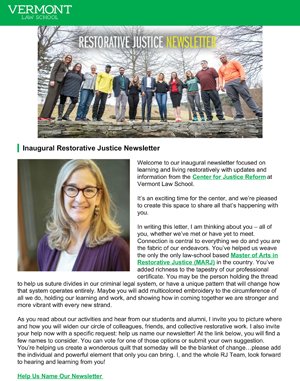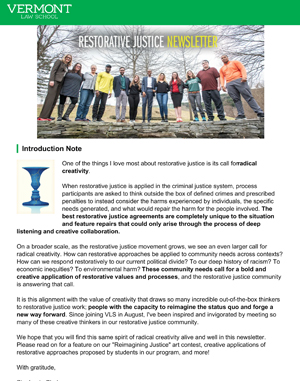Clinic client and environmental justice organization LEAD Agency files request with Federal Energy Regulatory Commission for community participation plan
Vermont Law and Graduate School’s Environmental Advocacy Clinic (EAC) submitted a filing to the Federal Energy Regulatory Commission (FERC) calling for a robust, comprehensive Community Participation Plan in the upcoming relicensing process for the Grand River Dam Authority’s (GRDA) Pensacola Dam in northeastern Oklahoma. The EAC made the request on behalf of its client Local Environmental Action Demanded Agency, Inc. (LEAD), an Oklahoma-based environmental justice organization with a long history of public education and advocacy in the region. The EAC has been representing LEAD in the dam’s relicensing process since the fall of 2022.
“It is essential that FERC use all of its authority to ensure a community-driven, equitable and inclusive relicensing process for the Pensacola Dam that will meaningfully address the dam’s impacts and consider more protective alternatives to GRDA’s proposals,” said Professor Christophe Courchesne, director of the Environmental Advocacy Clinic. “FERC can and should get this right from the start.”
“We need comprehensive solutions to the harms flooding from the Pensacola Dam has inflicted on our community,” said Rebecca Jim, LEAD’s executive director and Tar Creekkeeper. “That starts with robust community participation.”
The clinic filed its submission on LEAD’s behalf in anticipation of FERC beginning its review of GRDA’s application for a new federal license for the Pensacola Dam. The submission identifies the environmental justice concerns with relicensing and argues that, in light of those concerns, FERC must implement a robust, comprehensive Community Participation Plan. Specifically, the submission calls upon FERC to increase opportunities for meaningful community engagement and participation throughout the environmental review process, as well as extending comment periods so the community can meaningfully participate. The submission also calls upon FERC to engage with relevant agencies such as the U.S. Fish and Wildlife Service, the U.S. Army Corps of Engineers and the U.S. Environmental Protection Agency (EPA) in a transparent, collaborative manner.
“Our communities, and the injustices committed against us, have been ignored. This is a once-in-a-generation opportunity for FERC, and the federal government more broadly, to work with historically disregarded communities,” said Earl Hatley, president of LEAD’s board of directors. “We need a community-driven process, and that’s exactly what this submission demands.”
The Pensacola Dam has played a significant role in exacerbating recent flooding events upstream from the dam along the Grand River and the highly contaminated Tar Creek, one of the country’s first Superfund sites — and still one of its most polluted. These events can redistribute toxic sediments and threaten the health and safety of neighboring communities and Tribes, which have experienced harms from toxic pollution originating from long-abandoned lead and zinc mining operations in the area.
“GRDA has not been responsive to the community’s requests. Frankly, they have ignored the community’s requests,” said Grand Riverkeeper Martin Lively. “By adopting the measures articulated in our submission, FERC would be affirming its commitment to public participation and environmental justice.”
GRDA filed its final license application under FERC’s Integrated Licensing Process in May. Despite recent severe flooding events affecting communities upstream of the dam, GRDA is seeking authorization to maintain higher Grand Lake reservoir levels for recreational purposes. Further, GRDA is steadfastly refusing to conduct studies into the impact dam operations have on the spread of sediment contaminated with heavy metals.
The EAC’s filing follows recent news that the EPA will play a cooperating role in the FERC’s environmental review of GRDA’s license application. In October, Vermont Law and Graduate School (VLGS) Professor Mia Montoya Hammersley, director of the VLGS Environmental Justice Clinic (EJC), EJC Fello Fred Ole Ikayo and EJC Advanced Clinician Clara Derby traveled to Miami, Oklahoma, to attend a meeting between LEAD and the deputy assistant administrator for the U.S. EPA Office of Land and Emergency Management, Cliff Villa, to discuss the ongoing impact of the Tar Creek Superfund site on the surrounding communities. The EJC has also been working with LEAD on addressing the public health and environmental inequities facing the region’s residents.
Fall 2023 Environmental Advocacy Clinic student attorneys Greta Raser and Ian McDonald authored the clinic’s FERC filing.
About Vermont Law and Graduate School: Vermont Law and Graduate School, a private, independent institution, is home to a law school that offers ABA-accredited residential and online hybrid JD programs and a graduate school that offers master’s degrees and certificates in multiple disciplines, including programs offered by the Maverick Lloyd School for the Environment, the Center for Justice Reform and other graduate-level programs emphasizing the intersection of environmental justice, social justice and public policy. Both the law and graduate schools strongly feature experiential clinical and field work learning. For more information, visit vermontlaw.edu, visit Facebook, Twitter, and Instagram.
About LEAD Agency: Local Environmental Action Demanded Agency, Inc. (LEAD) is an environmental justice organization in northeastern Oklahoma that seeks to raise awareness about the effects of contamination on human health and the environment. Through public education, outreach, action, involvement with appropriate government agencies, and litigation, LEAD works to organize a citizen response toward cleanup and restoration of environmental harms, while striving for pollution prevention and environmental sustainability. For more information, visit www.leadagency.org and follow on Facebook.


















